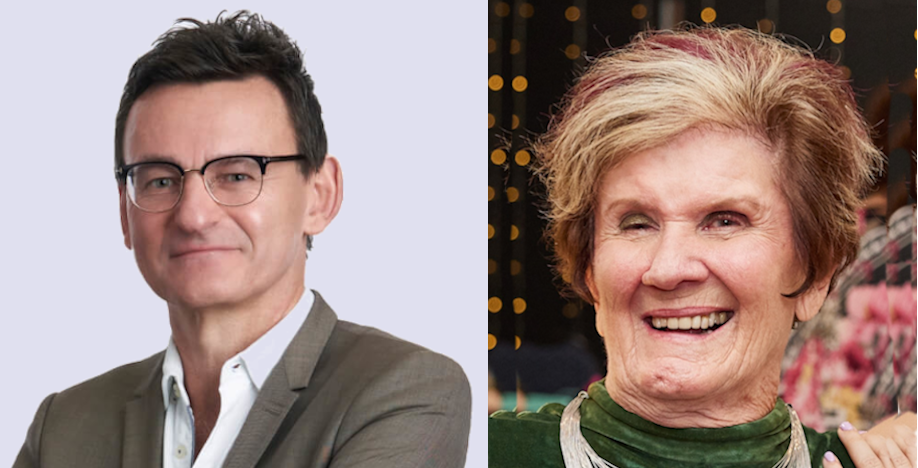2024 Pearcey Hall of Fame
Professor Svetha Venkatesh, Professor Andrew Dzurak and Jan Kornweibel were inducted into the 2024 Pearcey Hall of Fame at the Pearcey National Awards night on 19 November 2024 in Brisbane. The presentations were made by David Tudehope (2023 Pearcey Medal) and the Honourable Kate Lundy (2017 Pearcey Hall of Fame inductee).Professor Svetha Venkatesh
(See 2024 Pearcey Medal)
Professor Andrew Dzurak
Professor Andrew Dzurak is a recognised global leader in the field of quantum computing and, along with his fellow UNSW academic, Professor Michelle Simmons AO (2023 Pearcey Orator), he has been at the forefront of establishing Australia as a world leader in quantum computing.
Andrew is CEO and founder of Diraq, a full-stack quantum computing company using silicon 'quantum dot' technology developed by his team at UNSW over the past two decades. Prior to launching Diraq, Andrew was the foundational director (2007-2022) of ANFF-NSW, the NSW node of the Australian National Fabrication Facility where he spoke on quantum computing at the Pearcey Centenary Celebration at University of Sydney in March 2019. Andrew was also a key participant over 20 years ago in the establishment of the Australian Research Council (ARC) Centre for Quantum Computer Technology Quantum Computer Technology.
Andrew, with colleague Andrea Morello, demonstrated the world's first silicon quantum bits (qubits) in 2012, and over the past decade has developed a naturally scalable qubit technology by reconfiguring the ubiquitous CMOS transistors that make up all of today's silicon processor chips. Diraq's goal is to revolutionise quantum computing by driving qubit numbers on a single chip to the many millions, and ultimately billions needed for useful commercial applications.
Andrew holds more than 30 patents and has published over 200 research papers, including six seminal papers in Nature that include the world's first demonstrations of one-and two-qubit quantum logic calculations in silicon chip devices. Andrew holds a PhD in Physics from the University of Cambridge (UK) and a BSc (Hons) from the University of Sydney. Notably, Andrew received the 2011 Eureka Prize for Scientific Research, and his demonstration of a CMOS-based quantum logic was selected by Physics World, UK as one of the world's Top Ten Scientific Breakthroughs for 2015. He is also concurrently a Scientia Professor in Quantum Engineering at UNSW Sydney, an ARC Laureate Fellow and a member of the executive board of the Sydney Quantum Academy.
Jan Kornweibel
Jan Kornweibel started working with computers in London in 1965 before landing an IBM programming position at TAB in Perth. While at TAB, she joined the West Australian Computer Society and was an inaugural member of the Australian Computer Society (ACS) when the two organisations merged in 1967. Jan gave 16 years of service to the WA Branch Executive Committee as a member and as WA Chair, was instrumental in coordinating the first ACS National conference in Western Australia in 1989, and has continued to mentor women in ICT throughout more than 50 years of membership of the ACS.
From the mid-1970s Jan laid the foundations for establishing recognition for computing to assist with disability, a field in which she continues to actively contribute to and support today. Jan led the first Special Interest Group for Computing Assisting Disabled People at the ACS, and she was at the forefront of instituting the early recognition and awareness of a range of issues with the practical application of computer aids to assist disability in Australia. In 1981 she was awarded a prestigious Churchill Fellowship by the Winston Churchill Memorial Trust, which enabled her to undertake research work in Europe, the UK and the USA, in the emerging area of using ICT to assist disabled people.
In her most recent role, since retiring from paid work, Jan worked for several years as a volunteer professional, in the Curtin University-based Autism Academy for Software Quality Assurance (AASQA) where she has single-handedly pioneered students on the autism spectrum to sit the ISTQB (International Software Testing Qualifications Board) certification examination, which a number have passed with quite outstanding results. Jan is a true role model for young ICT professionals, an advocate and worker for disabled, and now neurodiverse, people, and an inspiration to women in ICT. She is both a Fellow and an Honorary Life Member of the ACS.

